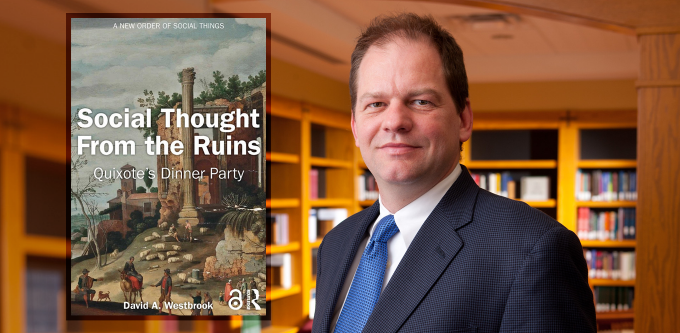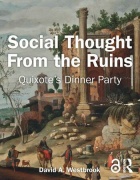
New book by Professor David A. Westbrook asks ‘How do we make peace with our modernity’
The book, SOCIAL THOUGHT FROM THE RUINS: QUIXOTE’S DINNER PARTY, is based on conversations among international social scientists between the 2008 financial crisis and Covid.
We are, says legal scholar David A. Westbrook, living in a transitional moment in history – a time when long-held assumptions about the world order and liberal democracy seem to be upended every day.
“Our history [seems] to have entered its autumn,” he writes. “How do we start building anew? What do we build, with what we still have?”
Westbrook's new book, SOCIAL THOUGHT FROM THE RUINS: QUIXOTE’S DINNER PARTY (Routledge, 2025), offers a deeply reasoned and ultimately hopeful set of answers.
Westbrook holds the Louis A. Del Cotto Professorship at the law school and directs the school’s New York City Program in Business and Law. He brings to his latest project insights from an international group of social scientists with whom he has been in conversation for the past two decades. Drawing on the best in interdisciplinary scholarship and thought, he proposes a way forward for both academics and policymakers.
“QDP is a long-term passion project, a collaborative effort to grapple with where we are as academics confronting the problems of the university, bureaucracy and power, and having an intellectual life today,” Westbrook says. “Maybe rethinking the humanities and critical social sciences, law included. That’s all!
“It’s very much a book about the intellectual zeitgeist, our anxieties and hopes and sensibilities, which are not entirely or even mostly rational topics. Therefore, in lieu of academic explication or argument, QDP is sort of polyphonic literary meta-scholarship, couched as a memoir of conversations among international social scientists between the financial crisis and Covid. As my interlocutor Vitor Gaspar, a senior official at the International Monetary Fund and formerly finance minister of Portugal said, ‘a book like no other.’”
SOCIAL THOUGHT FROM THE RUINS is built in five sections: Crises of Meaning; Curiosity; Powerful Subjects; New Buildings from Old Stones; and Hopes. Chapters address such topics as the role of curiosity inside and outside the university; the role of teaching in social change; and how it might be possible to humanize the bureaucracies that hold increasing sway over our lives.
“An extended critique of academic life today and the context of our own thinking,” Routledge says, “this book interrogates aspects of our modernity, with its pervasive sense of crisis and uncertainty, and the difficulty of thinking clearly about things like the state and power, data and violence.
“Will the critical social sciences have anything to offer the exercise of power, or are we doomed to incessant and ineffectual critique? Can bureaucracy be made at least more accountable, if not democratic? Conversely, can we feel less alienated from the structures of power that rule us, or that fail to govern at all? Can we feel at home?”
Colleagues in the wider academic community have lauded the value of the author’s critique.
“This is Westbrook at his best: sparkling insights, surprising connections, dashes of humor and thought-provoking reflections,” says Mary Ann Glendon, Learned Hand Professor of Law, emerita, at Harvard University, and a former U.S. Ambassador to the Holy See.
Adds Francisco O. Ramirez, Vida Jacks Professor of Education at Stanford University: “This fascinating book ends by inviting readers to begin again. To do what? To be engaged in imaging a second spring, no less. Via a set of erudite, quirky and controversial reflections on the erosion of meaning in key institutions, from the polity to the university, Westbrook invites readers to partake in conversations about freedom and security as well as knowledge and intellectuals.”
